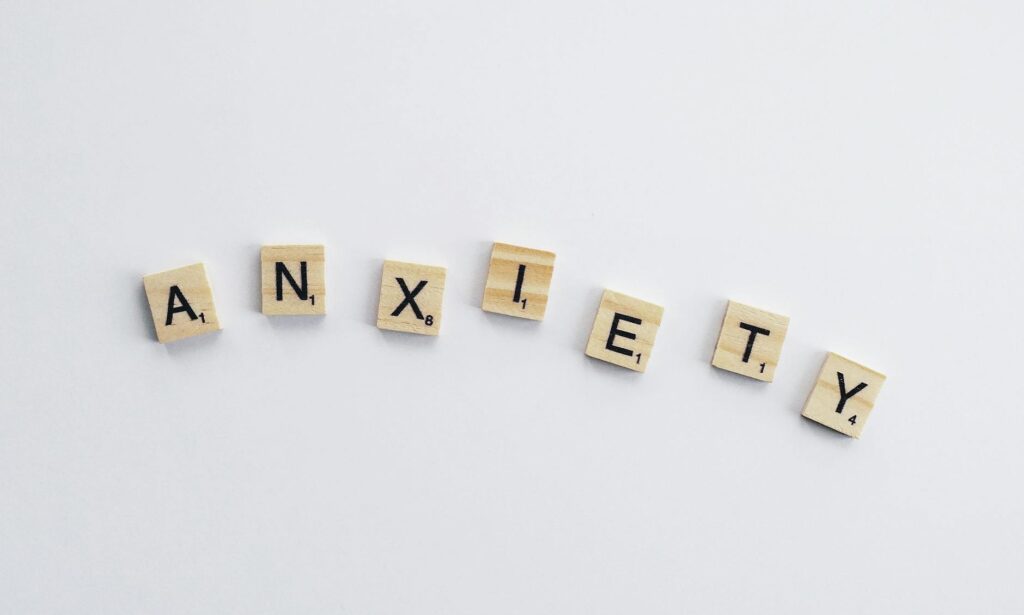Understanding Anxiety
Anxiety is a complex emotional and physiological response to perceived threats or stressors. It is important to differentiate between stress and anxiety, as they share similarities but have distinct characteristics.
Differentiating Stress and Anxiety
Stress tends to be a short-term response to a recognizable threat or pressure, while anxiety may linger and not have an easily identifiable trigger. Both stress and anxiety are part of the body’s natural fight-or-flight response, which is designed to protect us from danger.
During stressful situations, the body releases stress hormones, such as cortisol and adrenaline, which cause the heart to beat faster and result in increased blood flow to the organs and limbs. This physiological response prepares the body to either confront the threat or flee from it.
On the other hand, anxiety is the body’s response to stress. It can arise even when there is no immediate threat or danger. Anxiety can be characterized by persistent worry, fear, or uneasiness that may interfere with daily activities and well-being [2]. It is important to note that anxiety can manifest as a symptom of various anxiety disorders, which may require specialized treatment and support.
Similar Symptoms of Stress and Anxiety
Stress and anxiety share several common symptoms due to the activation of the body’s stress response. These symptoms can include:
- Increased heart rate
- Faster breathing
- Elevated blood pressure
- Heightened senses
- Release of nutrients into the blood to provide energy to all body parts.
While stress and anxiety have similar physiological responses, it is crucial to recognize the underlying differences between the two. If you are experiencing persistent and overwhelming fear, dread, or uneasiness that significantly impacts your daily life, it is advisable to seek professional help and explore appropriate treatment options.
Understanding the distinctions between stress and anxiety is essential for effectively managing these experiences. In the following sections, we will delve deeper into the transition from stress to anxiety and explore various aspects related to anxiety disorders, including treatment options and lifestyle management techniques. To learn more about specific types of anxiety disorders, refer to our article on types of anxiety disorders explained.
Transition from Stress to Anxiety
Stress and anxiety are two interconnected experiences that often go hand in hand. Understanding the transition from stress to anxiety is essential in comprehending the development and management of anxiety disorders.
Development of Anxiety from Stress
Stress is the body’s natural response to a threat or challenge, triggering a range of physical and emotional reactions. Anxiety, on the other hand, arises from prolonged or overwhelming stress. As stress persists, it can gradually lead to the development of anxiety.
When stress becomes chronic or exceeds an individual’s coping abilities, it can trigger anxiety symptoms. The exact mechanisms underlying this transition are complex and can vary from person to person. However, it is believed that persistent stress disrupts the body’s stress response system, leading to an imbalance in neurotransmitters and an increased sensitivity to future stressors [1].
It’s important to note that not all stress leads to anxiety disorders. However, chronic stress or traumatic events can increase the risk of developing an anxiety disorder if stress or anxiety becomes overwhelming [1]. Recognizing the signs and symptoms of anxiety is crucial for seeking appropriate support and interventions.
Managing Stress and Anxiety
Effectively managing stress and anxiety is essential for maintaining overall well-being. Various strategies can help individuals cope with these experiences:
Relaxation Techniques: Engaging in relaxation techniques such as deep breathing exercises, meditation, and mindfulness can help reduce stress and anxiety levels. These techniques promote a sense of calm and provide a valuable toolset for managing overwhelming emotions.
Physical Activity: Regular physical activity has been shown to be beneficial for both stress and anxiety reduction. Engaging in activities such as walking, jogging, yoga, or any form of exercise that suits an individual’s preferences can help release endorphins, improve mood, and alleviate stress.
Talking About Worries: Sharing concerns and worries with trusted friends, family members, or mental health professionals can provide emotional support and perspective. Talking openly about stressors and anxieties can help individuals gain insights, explore coping strategies, and feel less alone in their experiences.
It’s important to note that if stress or anxiety becomes overwhelming or persists over an extended period, it is advisable to seek professional help. Chronic stress or an anxiety disorder may develop in such cases, requiring specialized treatment.
For the treatment of anxiety disorders, psychotherapy and medications are the primary approaches. Cognitive Behavioral Therapy (CBT) is considered the most effective form of psychotherapy for anxiety disorders, aiming to identify and modify negative thought patterns and behaviors [3]. Medications may also be prescribed to help relieve symptoms, depending on the type of anxiety disorder and other individual factors [3].
In addition to psychotherapy and medications, lifestyle changes can play a significant role in managing anxiety disorders. These changes may include practicing stress management techniques, adopting a healthy diet, getting regular exercise, and ensuring adequate sleep [3]. Herbal remedies and dietary supplements may also be explored, but it’s important to consult with a healthcare professional before incorporating them into a treatment plan.
By recognizing the connection between stress and anxiety and implementing effective stress management techniques, individuals can take proactive steps towards maintaining their mental well-being. Seeking professional guidance when needed is crucial in navigating the transition from stress to anxiety and finding appropriate support and treatment options for anxiety disorders.
Treatment of Anxiety Disorders
When it comes to addressing anxiety disorders, there are various treatment options available. It’s important to note that anxiety disorders can be diagnosed and treated by mental health specialists such as psychiatrists, psychologists, and other professionals through counseling, also known as psychotherapy [3].
Psychotherapy for Anxiety
Psychotherapy, also referred to as talk therapy, is a fundamental treatment approach for anxiety disorders. One of the most effective forms of psychotherapy for anxiety disorders is cognitive-behavioral therapy (CBT). CBT aims to identify and modify negative thought patterns and behaviors that contribute to anxiety. Through this therapy, individuals develop effective coping strategies and learn to challenge and reframe anxious thoughts.
During psychotherapy sessions, individuals work collaboratively with a trained therapist to explore the underlying causes of anxiety and develop practical techniques to manage symptoms. This may involve implementing relaxation techniques, practicing mindfulness, and gradually confronting fears through exposure therapy. The duration and frequency of therapy sessions may vary depending on the severity of the anxiety disorder and individual needs.
Medications for Anxiety
Medications can be utilized to help alleviate the symptoms associated with anxiety disorders. The specific type of medication prescribed will depend on various factors, including the type of anxiety disorder and any co-existing mental or physical health conditions. It’s important to consult with a healthcare professional to determine the most suitable medication and dosage.
Some commonly prescribed medications for anxiety disorders include:
| Medication Class | Examples |
|---|---|
| Sertraline, Escitalopram |
| Venlafaxine, Duloxetine |
| Alprazolam, Diazepam |
| Propranolol, Atenolol |
It’s essential to note that medications may have potential side effects and may not be suitable for everyone. Regular monitoring and follow-ups with a healthcare professional are important to assess the effectiveness and safety of the prescribed medication.
In addition to psychotherapy and medications, making certain lifestyle changes can also contribute to the management of anxiety disorders. These changes may include incorporating stress-reducing activities such as exercise, practicing relaxation techniques, and maintaining a healthy lifestyle. However, it’s important to consult with a healthcare professional before considering any herbal remedies or dietary supplements, as more research is needed to understand their risks, benefits, and potential interactions with prescription medications.
When seeking treatment for an anxiety disorder, it’s crucial to work closely with healthcare professionals to develop an individualized treatment plan that addresses specific needs and concerns. By combining psychotherapy, medications, and lifestyle modifications, individuals can effectively manage and overcome the challenges posed by anxiety disorders.
Lifestyle Management for Anxiety
In addition to psychotherapy and medications, lifestyle changes play a significant role in managing anxiety disorders. These changes can have a positive impact on overall well-being and help individuals better cope with their symptoms. Let’s explore the importance of lifestyle changes and the role of herbal remedies and dietary supplements in anxiety management.
Importance of Lifestyle Changes
Lifestyle changes are essential for individuals with anxiety disorders. By making certain adjustments, individuals can improve their overall mental health and reduce anxiety symptoms. Here are some lifestyle changes that can make a difference:
Regular Exercise: Engaging in regular physical activity, such as walking, jogging, or yoga, can help reduce anxiety levels. Exercise releases endorphins, which are known as “feel-good” hormones, and can improve mood and overall mental well-being.
Healthy Diet: A nutritious diet can have a positive impact on mental health. Consuming a well-balanced diet that includes fruits, vegetables, whole grains, lean proteins, and healthy fats can provide the necessary nutrients for optimal brain function.
Adequate Sleep: Getting enough sleep is crucial for managing anxiety. Lack of sleep can exacerbate symptoms and make it more difficult to cope with daily stressors. Establishing a consistent sleep routine and practicing good sleep hygiene can promote better sleep quality.
Stress Management Techniques: Learning and practicing stress management techniques, such as deep breathing exercises, meditation, and mindfulness, can help individuals effectively manage anxiety. These techniques promote relaxation and provide tools to cope with stressful situations.
Avoiding Substance Abuse: Substance abuse can worsen anxiety symptoms and interfere with treatment. It is important to avoid or minimize the use of alcohol, caffeine, and recreational drugs, as they can trigger or intensify anxiety.
Herbal Remedies and Dietary Supplements
While herbal remedies and dietary supplements have been studied for anxiety treatment, caution is advised as more research is needed to understand their risks and benefits. It’s important to consult with a healthcare professional before incorporating any herbal remedies or dietary supplements into your routine, especially if you are taking prescription medications. Some commonly used herbal remedies and dietary supplements for anxiety include:
Valerian Root: Valerian root is a herb that has been used for centuries to promote relaxation and improve sleep quality. It may help reduce mild anxiety symptoms, but its effectiveness for severe anxiety is still uncertain.
Lavender: Lavender is known for its calming properties and is often used in aromatherapy. It may help reduce anxiety and improve sleep quality when used as an essential oil or in tea form.
Omega-3 Fatty Acids: Omega-3 fatty acids, found in fatty fish like salmon and mackerel, as well as in walnuts and flaxseeds, have been associated with improved mental health. While research on their specific effects on anxiety is limited, incorporating omega-3s into a healthy diet can have overall positive effects on well-being.
Remember, lifestyle changes and herbal remedies should not replace professional treatment for anxiety disorders, but they can complement existing treatments and support overall mental health. It’s crucial to work with a healthcare professional to create a comprehensive treatment plan tailored to your specific needs. For more information on different types of anxiety disorders, visit our article on types of anxiety disorders explained.
Types of Anxiety Disorders
Anxiety disorders encompass a range of conditions characterized by excessive and persistent feelings of anxiety or fear. Understanding the different types of anxiety disorders can help individuals recognize and seek appropriate treatment. In this section, we will explore two common types of anxiety disorders: Generalized Anxiety Disorder (GAD) and Panic Disorder.
Generalized Anxiety Disorder (GAD)
Generalized Anxiety Disorder (GAD) is a chronic condition involving a persistent feeling of anxiety or dread that can interfere with daily life. People with GAD experience excessive worry about various aspects of their lives, such as work, health, or relationships. These worries are often unrealistic or disproportionate to the actual situation.
Symptoms of GAD may include:
- Excessive worry or apprehension
- Restlessness or feeling on edge
- Difficulty concentrating or finding one’s mind going blank
- Irritability
- Muscle tension
- Sleep disturbances, such as trouble falling asleep, staying asleep, or having restless, unsatisfying sleep
It’s important to note that GAD symptoms can vary in severity and may persist for months or even years, impacting a person’s overall well-being and daily functioning. Treatment options for GAD include psychotherapy and medications. To learn more about GAD, visit our article on generalized anxiety disorder (GAD): symptoms and treatment.
Panic Disorder
Panic Disorder is characterized by recurrent and unexpected panic attacks, which are sudden periods of intense fear or discomfort. Panic attacks typically reach their peak within minutes and can be accompanied by physical and psychological symptoms. These attacks often occur without an apparent trigger, causing individuals to worry about future panic attacks and to make significant changes in their behavior to avoid triggering an attack.
Symptoms of a panic attack may include:
- Palpitations or accelerated heart rate
- Sweating
- Trembling or shaking
- Shortness of breath or a feeling of smothering
- Feelings of choking
- Chest pain or discomfort
- Nausea or abdominal distress
- Dizziness or lightheadedness
- Fear of losing control or going crazy
- Fear of dying
Panic Disorder can be highly distressing and impact a person’s quality of life. It is important to seek help from a healthcare professional to manage and treat panic attacks effectively. To learn more about Panic Disorder, visit our article on panic disorder: recognizing and managing attacks.
By understanding the different types of anxiety disorders, individuals can gain insight into their own experiences and seek appropriate support. If you or someone you know is struggling with anxiety, it is important to consult with a healthcare professional for an accurate diagnosis and personalized treatment plan. Remember, help is available, and effective treatment can significantly improve the quality of life for those living with anxiety disorders.
Specific Anxiety Disorders
Anxiety disorders encompass a range of conditions that can significantly impact a person’s daily life. In this section, we will explore two specific anxiety disorders: social anxiety disorder and phobias and related disorders.
Social Anxiety Disorder
Social anxiety disorder, as described by the NIMH, involves an intense fear of being watched and judged by others, leading to avoidance of social situations. Individuals with social anxiety disorder may experience symptoms such as blushing, sweating, trembling, rapid heartbeat, muscle tension, and nausea.
The fear of being humiliated or embarrassed can be overwhelming for those with social anxiety disorder, causing them to avoid social interactions, including public speaking, parties, or everyday situations like eating in front of others. This can have a significant impact on their personal and professional lives.
Treating social anxiety disorder often involves a combination of therapy and, in some cases, medication. Cognitive-behavioral therapy (CBT) is commonly used to help individuals identify and challenge negative thought patterns, develop coping strategies, and gradually face their fears in a supportive environment. Medications, such as selective serotonin reuptake inhibitors (SSRIs), may be prescribed to help manage symptoms.
For more information on social anxiety disorder, please refer to our comprehensive article on social anxiety disorder: beyond shyness.
Phobias and Related Disorders
Phobias are characterized by an intense fear or aversion to specific objects or situations that is disproportionate to the actual danger posed. Phobia-related disorders encompass a variety of conditions, including specific phobias, social anxiety disorder, agoraphobia, separation anxiety disorder, and selective mutism. These disorders can significantly impact an individual’s quality of life and daily functioning.
Specific phobias involve an intense fear of specific objects or situations, such as heights, spiders, or flying. The fear experienced is extreme and can result in avoidance behaviors. Social anxiety disorder, as mentioned earlier, is characterized by a fear of being watched and judged by others. Agoraphobia involves a fear of being in situations where escape may be difficult or help may not be readily available. Separation anxiety disorder is typically seen in children and involves excessive anxiety when separated from a primary caregiver. Selective mutism is a condition where individuals consistently fail to speak in specific social situations, despite being capable of doing so in other circumstances.
Treatment for phobia-related disorders varies depending on the specific disorder and its severity. Psychotherapy, particularly CBT, is often used to help individuals understand and manage their fears. Medications may also be prescribed in some cases to alleviate symptoms and support the therapeutic process.
For a more comprehensive understanding of the various types of anxiety disorders, please refer to our article on types of anxiety disorders explained.
- [1]: https://www.medicalnewstoday.com/articles/stress-vs-anxiety
- [2]: https://medlineplus.gov/anxiety.html
- [3]: https://www.mayoclinic.org/diseases-conditions/anxiety/diagnosis-treatment/drc
- [4]: https://www.nimh.nih.gov/health/topics/anxiety-disorders
Did You Know? According to WHO, one out of every seven teens is struggling with some sort of mental illness.










